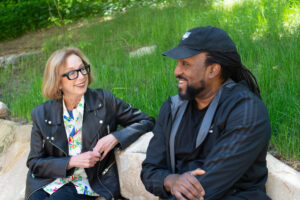Eric Hynes
This week Sundance Film Festival audiences have been taken to other countries, other worlds, and other realities via the power of film, but this afternoon Anna Deavere Smith transported a crowd at the Egyptian Theatre through the bare essentials of theatre – voice, expression, and deep conviction.
As part of the festival’s Offscreen discussion series, Smith sat down with Michele Norris of NPR’s All Things Considered to talk about her career and craft. She also performed sections of her current one-woman play about health care, Let Me Down Easy, which was created, as with all of her plays, from a painstaking process of research and immersive impersonation.
After conducting hundreds of interviews, Smith selects characters for her plays based on a simple but essential criterion. “Each character understands something I can’t understand,” she said. “And each of those things is very important.” For the current play, often all she had to do to elicit responses about her subject’s health and medical treatment was to turn on the tape recorder and ask one simple question: “What happened to you?”
For the audience at the Egyptian, Smith performed two very different characters from Let Me Down Easy: a New Orleans-based doctor named Kirsta, and a bullrider from Idaho named Brent. In the monologues, Kirsta’s sense of security is shattered, and her awareness of class privilege is heightened, by Hurricane Katrina; while Brent, described by Smith her most politically conservative character, voices its most progressive opinion.
Norris asked how she found the essential character of someone, to which Smith replied simply: “I don’t.” She then continued: “The more you try to lock something down, the more it’s going to be elusive. The elusive is what I respect.” More than a humble acknowledgment of the limitations of her craft, she extended the thought into something like a philosophy or ethic of life. “I’m living in this limbo place, which is a very active state,” she said. “Reaching for something I’ll never get to, but I’m always reaching.”
Norris credited her art for its willingness to go past the point when others might look away, but Smith asserted that all art should do this. Rather, she talked of what she does in terms of where she looks, rather than how. “I’m looking at stuff that’s not looked at as often,” she said, whether it’s race, class, illness, or mortality. “I think people want to look at these things, they just don’t know it.”
Read a full interview with Anna which took place earlier in the Festival.




